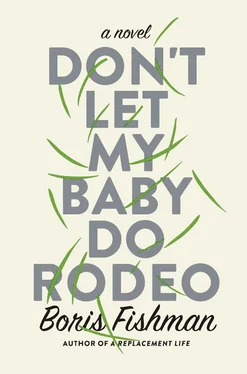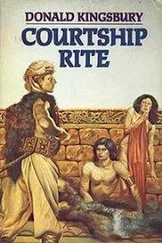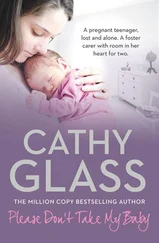Eugene and Alex turned to her, remembering she was there. They exchanged looks. Even in her fog, she understood that the question of what to say to Maya had been discussed before her appearance.
“He left school on the bus,” Alex said. He pushed away his bowl. “The town bus. The one you rode. Why he got off where he got off, obviously, the woman couldn’t say. It’s a farm. Her son came in for dinner and said there’s a boy in the river. Her son’s not all there — our Max knows how to pick them. He’s got a scent for the insulted and injured. In any case, she runs down and there’s our boy, sitting in her river. Facedown.”
“Sitting?” Maya said.
“He says he was counting the pebbles,” Alex said.
“What did she say?” Maya said.
“She said, ‘I can’t promise you your son wasn’t trying to hurt himself.’”
Maya’s chest filled with dismay.
“It’s just the American obsession with insurance,” Alex said.
“If she was obsessed with liability, she would’ve been sure,” Maya said. “In the other direction.”
“It’s like George Washington,” Alex said. “She’s American, so she can’t not tell the truth.”
“Don’t you want the truth?” Maya said.
Alex looked at his wife — now she would ask questions without an answer? Because he could do the same.
No one knew what to say, so they sat silently. Eugene moved around invisible crumbs on the table, his habit. Alex stared at his clasped fingers. Raisa eyed the sink of dishes with anticipation — it would provide her distraction when it was right to absent herself from the table. Finally, Maya set aside her glass, rose, and walked out of the kitchen, the Rubins following her warily with their eyes, as if now she, too, had become a flight risk, as if during her disappearance she had picked up some kind of microbe that rendered her foreign and incomprehensible. Maya took the stairs to the second floor. Gently, she pushed open Max’s door, a triangle of light from the hall entering with her. Max was on the bed, a small hump rising and falling inside the cloud of the blanket.
Maya closed her fist over her mouth and sank softly to the carpet. Worried her son would wake up and see her, she made herself rise and came close to the bed, where she watched Max for a long minute. Hating herself for her lack of restraint, she rustled his arm. His eyes opened quickly, as if he had been awake behind their false curtain. He blinked twice.
“What’s happening with you, my child?” she said.
“Am I in trouble?” he said.
“You had us worried,” she said. “No, you’re not.” She took one of his hands between hers. “Are you okay?”
Max blinked, shimmied his lips, and nodded. She took a palm to his cheek. He felt cool, settled. She ran her hand carefully through his hair, wanting to feel its straight spokes under her fingers. The fingers felt hot, and the spokes would be cool. Her son’s hair always occurred to her as an outbreak of pine needles, spiky and calm. She felt for the part, on the left side, that resisted every sweep in the other direction. Did Max’s father have a part in his hair — this was always her next thought. He had nothing but stubble the time Maya had laid eyes on him. Max’s hair reached his eyes — she was going to take him to the barber on Saturday, after Oliver — but she liked it this way. Then she wondered if she liked it because it made him look different from his father. His birth father. She tucked a strand behind an ear.
“Max, why did you do that?” she said. “Why would you go off without telling us?”
“I don’t know,” he said.
“You have to do better than that, Max. Please. You walked out from school with everyone else.”
He nodded.
“And then? How did you end up on the other bus?”
“I walked to the stop. They take us past it when we go for recess. They have brochures with the time that it comes.”
“But why, Max, why?” she pleaded.
“I don’t know,” he said. “I wanted to go away. I was sad.”
“But why?” she yelped. She crouched by his bedside. “Why were you sad? Darling, tell me.”
“I don’t know,” he said.
“Oh, Max,” she said. “No. No.”
“I’m sorry,” Max said, and turned to the wall.
“There’s one thing you have to tell me,” Maya said. “You promise to tell me the truth? What were you looking for under the water?”
He turned to face his mother again. “I was counting the pebbles,” he said.
“Why?” Maya said.
“They were pretty. They had different colors. Some of them looked like peas with eyes. Others were bigger — they were like the parents of the little ones. They were all there together.”
“But you can’t put your head in the water like that, Max. I know you’re careful, but even when we’re careful, things can go wrong. Do you hear me?”
“I tried to count them without putting my face in, but the water was moving too fast. I can hold air for more than a minute. Papa can tell you. You don’t come with us to Mexico, you don’t know. If you came with us, you would know.”
“Papa comes with you and he’s worried,” Maya said.
“I don’t know!” Max shouted. He buried his face inside his blanket and turned to face the wall once again.
Maya gave up her questioning. The headache that she had been, for hours, too upset to notice finally forced her to notice. She rustled Max’s arm again, a soft something under the blanket. He looked back again and they gazed at each other. “Tell me what it was like,” Maya said.
Max scratched his ear pensively like an old man, and his face loosened. “There was a boy there who was sick.”
“Sick? In what way?”
“He said funny things. Ba-ba-baa.”
“Did he scare you?”
“No. I liked him.”
“Did you tell him that?”
“No. Should I have told him?”
“I bet he could tell. I bet he liked you, too. You’re very likable. I’m sorry I woke you. I’m sorry I raised my voice just now.”
“I wish I’d told him.”
“Don’t be upset that you didn’t tell him. I think he knew. Very often, people know what you mean even if you don’t say anything.”
“Is Papa mad at me?”
“Papa doesn’t know how to be mad at you. But if you want to do that again, you have to tell us. If you want, we can come with you. I will come with you, for sure. Maybe I’ll like it, too. Can you promise me that?”
Max nodded. She wanted to believe him, but didn’t. “If you’re sad,” she went on, “why not come to me? We’ll do something together. We’ll cook something fun. And if that doesn’t work, we’ll get the tent back out when Grandpa is gone. And we’ll call Oliver, and have a slumber party. And when one of these things makes you not sad anymore, you tell me, and from then on we’ll know how to fix it.”
Max didn’t say anything, just lay there contemplating her words.
“I’m sorry I woke you,” she said.
“I don’t mind. I’ll fall asleep right away.”
“Okay,” she said. “Hey, I like your hair this long.”
He started rubbing the heel of a palm in an eye. He kept going, and she forced away his hand. “Come on, you’ll make it red,” she said. But really it was because she was fearful that every strange gesture meant something strange.
“Can I ask something?” he said.
“Of course you can.”
“You were the same age as me once, right?”
She laughed. “Yes, I was, baby. Yes.”
“Were you like me?” he said.
She reached for his shoulder under the blanket. “I don’t know,” she said. “I don’t remember a lot. My mother — your grandmother — you met her when you were tiny — we spent every day in the summer together. Do you know what we would do? We would go to the department store and buy a box of the cheapest glasses they had. Twenty glasses. Each one had a different fish stenciled on it. Then we dragged this box to the garbage terminal. All the garbage in the city went there. It smelled so bad out there. The men who worked there stopped to stare at us. They were not like regular men — if you worked at the garbage terminal, that meant you couldn’t get a job somewhere else. But they weren’t mean — just puzzled. They watched as we took the glasses out of the box one by one and threw them at the back wall of the building. They smashed into tiny little pieces.”
Читать дальше












